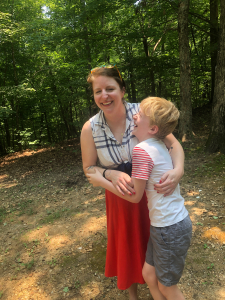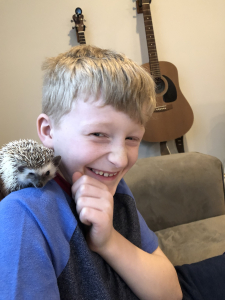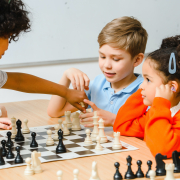In the course of everyday family life involving school-aged children, schedule demands often dictate the shape and form of interaction. Conversation may feel less like an in-depth news interview and more like a quick declaration aimed at a passenger who has just leapt on a departing subway. The chance to say “have a seat and tell me all your news” may return someday, but now is not that season in the flowing river of time.
So, it was a particular, shiny little delight, unplanned and brief, to get some conversational time alone recently with my grandson Buddy. His sister required his mom’s undivided attention for something important, so Buddy came over to hang out with me for a couple of hours. As dusk began to settle over the neighborhood on the hot summer evening, we took the dog out for a stroll.
Buddy turned 10 when I was away for a few months in a temporary home, and I am still catching up to the people he and his sister became in my absence. Perhaps it’s the warping of time in our pandemic era that distorts perfectly natural progression, but the changes in both of them have popped my eyes open since I came back to live nearby.
A young man of deep thoughts, Buddy is still not always the first to launch a sociable conversation. As we ambled down the street at the moderate pace natural to summer in the South, I nattered on idly, trying, without pushing, to land on a subject of interest. We approached a patch of woods with thick, spiky green undergrowth crowned with purple and white wildflowers. A white-tailed rabbit sprang out of the bushes and bounded across the street in front of us in a flash, startling the dog away from his close inspection of a redolent street grate. “We have a lot of bunnies in the neighborhood,” I offered. “They drive the dog crazy.”
“Did you know,” Buddy responded thoughtfully, “that kangaroos can’t move their back legs separately? They have to move together. That’s one reason why they hop.” Making my own leap forward to track with this hopping theme, I asked him the eternal, adult-to-kid query: Where did you learn that? Pushing his glasses back up his nose, he shrugged his thin shoulders. “I don’t remember; I think I read it somewhere.”
I nodded appreciatively at this nugget, and we continued downhill, where the road is bordered by an intriguing meadow that opens between two dense clusters of scraggly old trees. You can’t quite view the full expanse of the grass, shrubbery and weeds from the road, and I am curious about what lies beyond the narrow, visible opening. One day you and your sister can bring your boots over and we’ll explore down there, I told him. There might be a little creek we could wade in, but you’ll have to have boots, because there might be snakes.
“Do you know,” he began again, “how to tell the difference between poisonous and non-poisonous snakes?” I don’t, I admitted, beginning to feel like a batter in the practice cage who wasn’t warned when someone switched on the pitching machines at high speed.
“Poisonous snakes have slit eyes, and snakes with round eyes aren’t poisonous.” Anticipating the previous query, he added, “We learned that from a ranger at the park where we went camping. I’ll take him now,” he finished, reaching for the dog leash, the nature lesson concluded. The two of them went running down the hill ahead of me, leaving me to watch this long-legged, decade-old, human encyclopedia of facts sprinting for the joy of it on a summer night, the dog on his six-inch legs trying desperately to keep up.
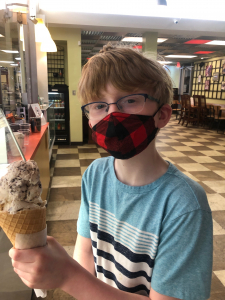
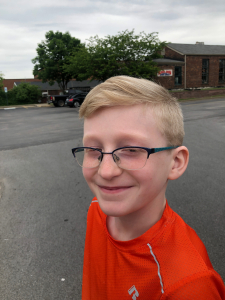
When you get to observe a burgeoning young intellect up close, you learn that its beam roams widely, illuminating the joyful, the troubling, and things in between. Not long before our walk, I stood by quietly as Buddy engaged his mother in a spirited discussion. She’d been after him to learn a particular skill, and his resistance grew in equal measure to her pleas. This skill had been around for centuries, she reasoned on this particular go-round, and it wouldn’t have survived that long if it wasn’t worth doing. He dispatched this logic with startling alacrity. “Lots of things stayed around for a long time that shouldn’t have,” he riposted. “Racism. Sexism.” I could offer nothing here, stunned into silence by this precocious application of logic.
We all think our grandkids are brilliant, right? Hang on, before the chest puffs out too much. If you delude yourself into thinking one demonstration of intellect forecasts another, a trap awaits. A child psychologist probably has a clinical term for this, but mine is Office Hallway Brain: If the noggin contains a complex series of passages, flipping the light switch in one clearly does not illuminate the others. Buddy may argue effectively against discrimination or spot a poisonous snake, but he often can’t find his way, literally, from Point A to B.
Reporting on the first day of school, his mother mentioned that pandemic restrictions prevented parents from accompanying the students to their homerooms that crucial first time. As she ushered him out of the car, she encouraged, “Okay, remember, Buddy, room 245. 2-4-5.” Clambering up the steps to the main entrance, he looked back at her, and she raised a hand to wave and signal a final reminder: Two fingers, four fingers, then all fingers. Still, he forgot his room number the second the huge metal door slammed behind him, a clash of cymbals proclaiming his official arrival at Middle School. He was on his own to navigate he knew not where.
Back at my house that recent summer evening, the dog’s walk concluded, he cast around for something else to do. “Evie,” he inquired politely, “do you play chess?” I don’t, I answered, instantly thrown back in memory to a day, a half-century before, when my father tried to teach me. Maybe impatient about the complex analysis and slow pace of the game, or maybe cowed by Dad’s commanding skill level, I couldn’t stick with it. With a brief swell of embarrassment that turned quickly to curiosity, I turned my next comment a different direction: It’s so cool that you play, I continued. Who do you play with? Do you have your own set at home? Tell me more.
I used to think the window would be open longer, the period of time when I had the privilege of sharing what I know with these children, where my own life skills, even the smallest, practical things, like how to slice a juicy summer peach, might help them along the way. How quickly it is changing, in just a flash, to where I may learn (if I keep my mouth shut and listen) more than I can teach. Maybe there will be other lessons to share later, fewer of the kind you teach with your hands and more of the ones you teach with your heart, and the ones you show with your behavior. I guess we’ll see. Meanwhile, it appears my job is changing from instruction and guidance to witnessing, to appreciation and encouragement, and to listening as I walk alongside.
I hope I have the sense to listen. Because I sure wouldn’t know one snake from another, without a kid to teach me.
